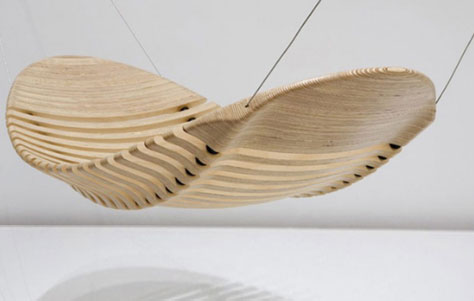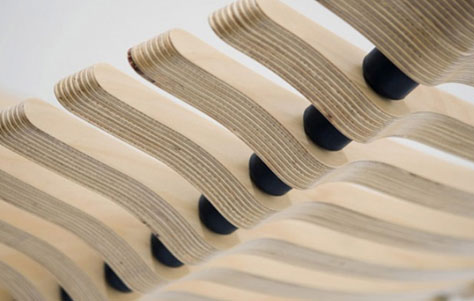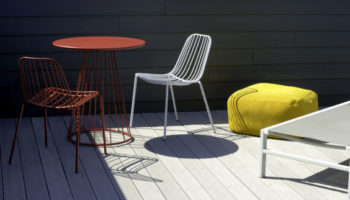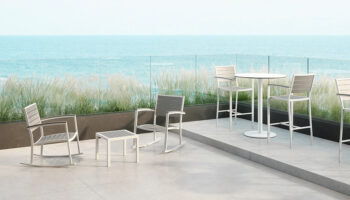Adam Cornish’s Wooden Hammock
Among the scant few hammocks whose luxuriating lines we’ve virtually encountered here on 3rings—Royal Botania’s Kokoon, Victor Aleman’s Mua, and Dedon’s Nestrest—fabric seems to hold sway as the material of choice. Hardly surprising that, given its lineage as constituting the very essence of the concept, which I might crudely summarize as “something soft and pliable hung between two trees.” In light of this common knowledge, the daring design by Australian Adam Cornish is all the more surprising. His “Wooden Hammock,” winner of the recent Herman Miller design competition, is constructed entirely of plantation-grown plywood, except of course for its supportive cords, the suspension apparatus that establishes its “hammock-ness.”
Wooden Hammock. Deigned by Adam Cornish.
An Ergonomics of Human Movement
One commentator is on record as saying she likes the piece because it “looks like a human spine.” That attribute is certainly cause for affection, since we’ve no choice but to love the very makings of our interior physiology. But what might the comparison say about the Wooden Hammock’s functionality? Plenty, as it were, since the individual junctions between segments of laminated plywood and rubber bumpers facilitate motion in much the same way as our vertebra and discs. The assembly allows a flexion-extension/lateral rotation movement to occur, that, very like our own backbones, helps one to find the most comfortable position for a given set of constraints.


In day to day life, these constraints run the gamut from sitting at your desk, to bending down to pick up your kids, to getting in and out of your car. With the Wooden Hammock, however, the constraint is of a more modest variety, narrowed, in fact, to the enviable pastime of lying down. Even so, the piece expands the repertoire of this essential human activity—beyond the bed, beyond the sofa, beyond the traditional stretch of fabric that constitutes the traditional hammock. What’s more, the Wooden Hammock conveys a striking new aesthetic that blends placidity with panache, thus lending a bold, if Buddhist, addition to your backyard landscape.
Via Inhabitat.




Leave a Reply